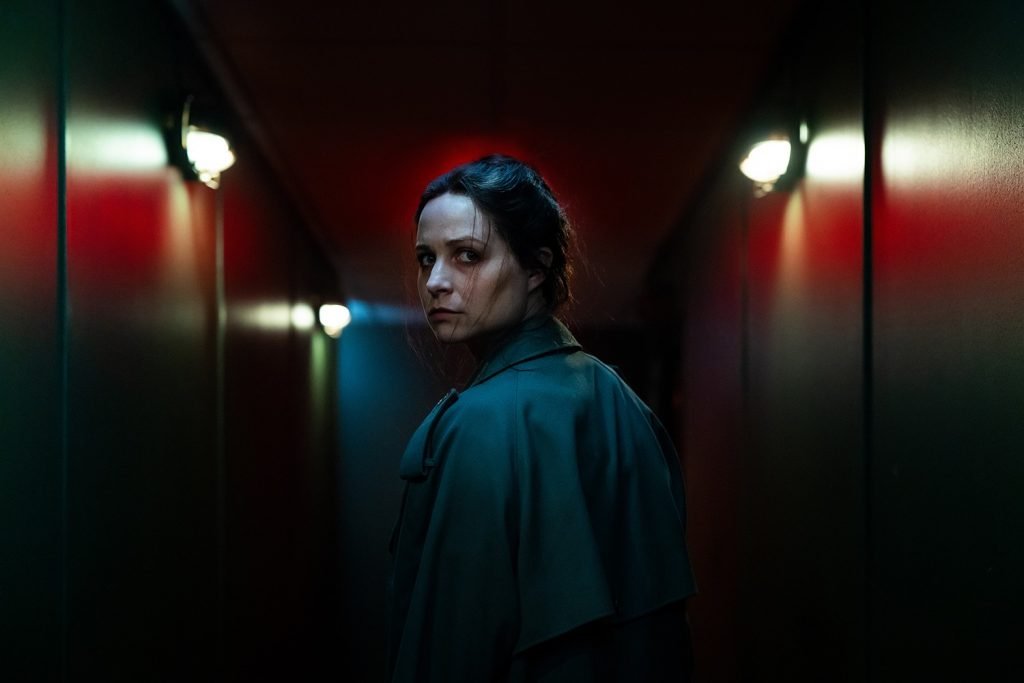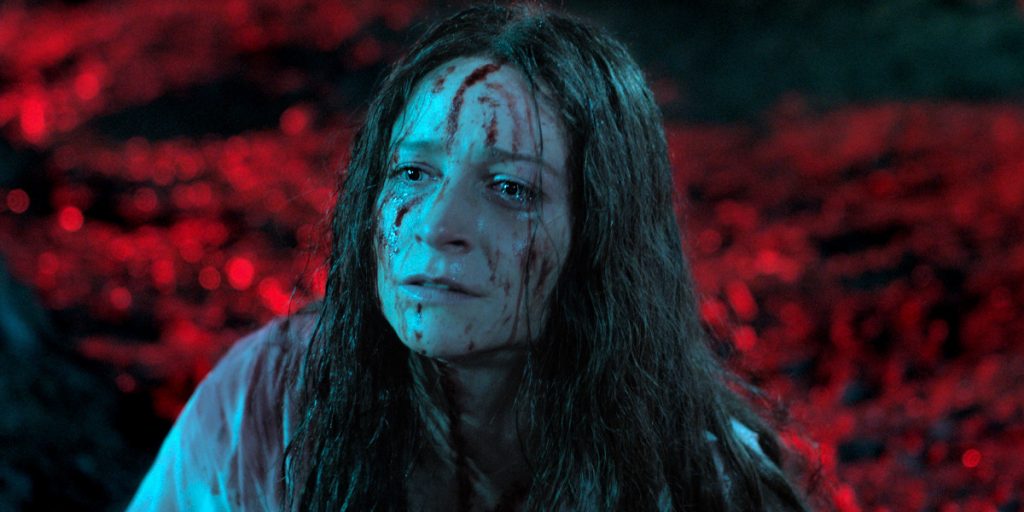Drenched in red shadowy lighting and a slow burn atmosphere, Censor crafts a nightmarish tale of video violence that takes its schlocky premise too seriously.
If you’re a devoted genre cinema fan, you’ve likely encountered plenty of “video nasties”—horror and exploitation films that were cut (and in some cases banned) for lurid sexual and violent content during a period of moral panic in 1980s England. In her feature debut Censor, co-writer and director Prano Bailey-Bond pays homage to this infamous cinema hysteria with the story of a film censor and a cursed cult film that takes her on a nightmarish trip that just may unlock the secrets of a deep-seated family trauma. Partly inspired by her earlier 2015 short Nasty and following in the tradition of similar VHS-terror films like Videodrome, Censor explores the transformational power of the screen image and resulting surreal acts of violence.
Censor follows Enid (Niamh Algar), a film censor who watches horror features and makes notes on what needs to be cut to secure a video release. Enid’s life is soon thrown into a tailspin when a horrific crime is committed after the perpetrator watched one of the films she helped cut. Smeared in the tabloids and harassed over the telephone, the sensational press and angry public hold her responsible for letting this violent act happen. Meanwhile, her parents (Andrew Havill and Felicity Montagu) give her more startling news—a copy of a death certificate for her missing sister Nina (Amelie Child Villiers). Nina mysteriously disappeared during an incident in the forest years before and her loss still haunts Enid, who believes that she is still alive and refuses to accept the closure her parents offer her.
One day at work, Nina meets the lecherous producer Doug Smart (Michael Smiley), who mentions that she should watch the newest film from director Frederick North (Adrian Schiller). It turns out that that is her next film to censor—”Don’t Go into the Church”, a gruesome slasher flick set deep in the woods. While watching the film, Enid notices eerie similarities to Nina’s disappearance and begins experiencing traumatic flashbacks. Disturbed by the film yet feeling curious about this strange discovery, Enid begins a search to see if her sister might be alive, and travels down a strange, nightmarish rabbit hole through the dark side of the world of film.

Censor feels remarkably familiar, and far too often, plays like the stereotypical kind of artsy, atmospheric, slow burn, meta horror film you’re guaranteed to see at almost any film festival. Tinged in red and dripping with a slow, surreal atmosphere, it feels almost exactly like something Peter Strickland might make, although the filmmaking feels a bit too modern to be a convincing 80s period piece. It’s mostly a film of buildup—except the buildup is too slow and uninteresting to hold your attention, even with its occasional flashes of surreal intrigue. Fortunately, the third act delivers on its delirious explosion of violence and madness, even drifting into unpredictable fantastical territory, but by the time it comes you’d wish that kind of feverish energy occurred much more frequently.
Thankfully, Censor is given a modest 84-minute runtime (the perfect runtime for a horror flick), instead of the typical tedious two hours these kinds of atmospheric horror films usually get, and, despite its occasionally placid pacing, it never outstays its welcome. Niamh Algar always keeps the film watchable in her gripping performance, giving Enid the necessary anxiety and vulnerability to realize a compelling character both in her moments of silent trauma and maniacal outbursts. Censor is clearly Algar’s show, although Michael Smiley makes a memorable turn as a repulsive antagonistic presence in his brief time on screen.
While Censor is far too predictable in its tone and approach, its greatest sin is that it takes itself too seriously. It never seems to be having much fun with itself outside of the fake films within the film and video nasties montage over the opening credits. Why bother paying homage of these kinds of films and not revel in their grotesque, delirious absurdity? It’s clearly a missed opportunity when Censor favors its languid suspense over its shlocky genre thrills, and despite its perceptive awareness of the gendered dynamics of horror films and the industry, its meta commentary about cinema and violence don’t go anywhere particularly new or interesting, and too easily gets lost inside itself.
Censor was screened digitally at the 47th Seattle International Film Festival on April 8-18, 2021. The film was released theatrically in North America on June 11, and in the UK and Ireland on August 20, and is now available to watch on demand.

